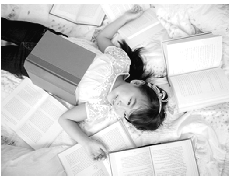
科目: 來(lái)源: 題型:
【題目】Ann __________to choose her own clothes.
A. allow B. is allow
C. allowed D. is allowed
查看答案和解析>>
科目: 來(lái)源: 題型:
【題目】_________, he doesn’t hurt_________.
A. Lucky, badly B. Luckily, bad C. Luckily, badly D. Lucky, bad
查看答案和解析>>
科目: 來(lái)源: 題型:
【題目】---Are you Millie?
---_____________ .
A.No, I am B.Yes, I’m not
C.No, I’m Millie D.Yes, I am
查看答案和解析>>
科目: 來(lái)源: 題型:
【題目】Trees are very important. We can't ________.
A. cut them down B. cut it down C. cut down them D. cut down it
查看答案和解析>>
科目: 來(lái)源: 題型:
【題目】--- Do you know _____ by the police last night? --- Yes, because he spread a rumor(謠言) on Wechat.
A. how was a teenager caught
B. how a teenager was caught
C. why was a teenager caught
D. why a teenager was caught
查看答案和解析>>
科目: 來(lái)源: 題型:
【題目】---____________________
--I'd like some noodles, please.
A. How do you do? B. What do you do?
C. How are you? D. What can I do for you?
查看答案和解析>>
科目: 來(lái)源: 題型:
【題目】 Research has already suggested that opening a book may help improve brain function and reduce stress. Now, a team led by Joanna Sikora of the Australian National University is looking into the benefits of growing up around a bookfilled environment; the researchers' new study suggests that homes with libraries can arm children with skills that last well into adulthood.

The study looked at data from 160 000 adults from 31 countries, including the United States, Australia, Turkey and Chile. Participants (參與者) filled out surveys with the Programme for the International Assessment of Competencies, which measures proficiency (水平) in three areas: literacy (讀寫(xiě)能力), numeracy and information communication technology. People, 25 to 65 years old, were asked to tell how many books were in their house when they were 16 years old. The research team was interested in this question because home library size can be a good sign of “bookoriented socialization.” Participants were able to choose from a given range of books that included everything from“10 or less” to “more than 500.”
The surveys, which were taken between 2011 and 2015, showed that the average (平均的) number of books in participants' childhood homes was 115, but that number varied widely from country to country. The average library size in Norway was 212 books, for example; in Turkey, it was 27. In all, however, it seemed that more books in the home was linked to higher proficiency in the areas tested by the survey.
The effects were most marked when it came to literacy. Growing up with few books in the home resulted in below average literacy levels. Being surrounded by 80 books raised the levels to average, and literacy continued to improve until libraries reached about 350 books,at which point the literacy rates leveled off. The researchers saw similar things when it came to numeracy; the effects were not as pronounced with information communication technology tests, but skills did improve with increased numbers of books.
So, what does the new study tell us? Take, for example, an adult who grew up with hardly any books in the home, but went on to get a university degree compared to an adult who grew up with a large home library, but only had nine years of schooling. The study found that both of their literacy levels were almost the same. “So, literacywise, bookish childhood makes up for a good deal of educational advantage,” the study authors write.
Further research is needed to decide exactly why exposure to ( 沉浸在) books in childhood encourages valuable skills later in life, but the study offers further evidence to suggest that reading has a powerful effect on the mind. And so home library size might be important because, as the researchers note, “children emulate (模仿) parents who read.”
【1】The second paragraph is mainly about .
A.what the study found out
B.how the study was carried out
C.who were invited to the research
D.why the researchers did the study
【2】The phrase “leveled off” in Paragraph 4 probably means “ ”.
A.backed to averageB.started falling
C.continued to growD.stopped rising
【3】The example in Paragraph 5 shows .
A.the disadvantage of having little school education
B.the effect of having a home library in childhood
C.the necessity of raising people's literacy level
D.the importance of getting a university degree
【4】What can we learn from the passage?
A.The study explained why bookish childhood encouraged valuable skills.
B.Adults benefit more from a home library than children.
C.Home library size has little to do with numeracy level.
D.Parents who love reading benefit children a lot.
查看答案和解析>>
科目: 來(lái)源: 題型:
【題目】—Listen! A girl ______ in the next room.
—Oh, she must be Amy.
A. sing B. sings C. singing D. is singing
查看答案和解析>>
科目: 來(lái)源: 題型:
【題目】--Lin Tao's English is excellent!
--Of course! He practices _____ English every day!
A. reads B. reading C. to read D. read
查看答案和解析>>
百度致信 - 練習(xí)冊(cè)列表 - 試題列表
湖北省互聯(lián)網(wǎng)違法和不良信息舉報(bào)平臺(tái) | 網(wǎng)上有害信息舉報(bào)專區(qū) | 電信詐騙舉報(bào)專區(qū) | 涉歷史虛無(wú)主義有害信息舉報(bào)專區(qū) | 涉企侵權(quán)舉報(bào)專區(qū)
違法和不良信息舉報(bào)電話:027-86699610 舉報(bào)郵箱:58377363@163.com